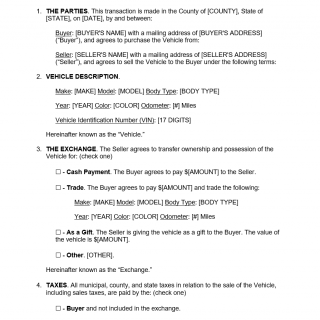Bill of Sale for Car
A Bill of Sale for Car is a legal document that records the transfer of ownership of a car from one party to another. The main purpose of this form is to protect both the buyer and the seller by providing a written record of the transaction.
The Bill of Sale for Car typically consists of several parts, including a description of the car being sold, the purchase price, and the names and addresses of the buyer and the seller. The form may also include important fields such as the vehicle identification number (VIN), make and model of the car, and any warranties or guarantees that are included in the sale.
When compiling the Bill of Sale for Car, it is important to consider the state-specific requirements and regulations that may apply. In some states, for example, the form may need to be notarized or witnessed by a third party. Additionally, the parties involved in the transaction will need to provide certain data such as their full legal names, addresses, and driver's license numbers.
In some cases, additional documents may need to be attached to the Bill of Sale for Car, such as the car's title or registration certificate. Application examples and use cases include when buying or selling a used car, transferring ownership of a car between family members, or when donating a car to charity.
The benefits of using a Bill of Sale for Car include providing a clear record of the transaction, which can help prevent disputes or legal issues that may arise in the future. However, challenges and risks may include the possibility of fraudulent activity or misrepresentation of the car's condition.
Alternative forms or analogues of the Bill of Sale for Car may include a vehicle purchase agreement or a sales contract. The key differences between these forms may include the level of detail provided, the specific terms and conditions of the sale, and the legal requirements that must be met.
Notarization
Whether a Bill of Sale for Car needs to be notarized depends on the state in which the transaction is taking place. In some states, such as Louisiana, Maryland, Nebraska, and West Virginia, a Bill of Sale for Car must be notarized in order to be considered legally valid.
In other states, notarization is not required, but it may still be a good idea to have the document notarized in order to provide an extra layer of protection and to ensure that the signatures on the document are authentic.
It is important to check the specific requirements in your state before completing a Bill of Sale for Car, as failure to comply with state regulations could result in legal issues or disputes in the future.
Once completed, the Bill of Sale for Car should be submitted to the appropriate state agency, such as the Department of Motor Vehicles (DMV), and a copy should be kept by both the buyer and the seller for their records.

